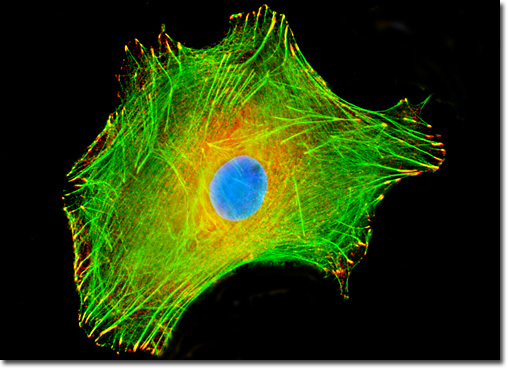Fluorescence Digital Image Gallery
Human Lung Carcinoma Cells (A-549)
|
The cytoskeletal actin filamentous network is anchored, in part, by focal adhesion contacts and adherens junctions, which are membrane-associated complexes that serve as nucleation sites for the filament termini. These centers also act as crosslinkers between the exterior cell matrix, plasma membrane, and actin cytoskeleton. Serving to connect the extracellular matrix to the actin cytoskeleton, the focal adhesion sites function as strategic structural elements. In addition, these complexes perform as sites of cellular signal transduction by initiating signaling pathways in response to new adhesion contacts. Among other proteins, focal adhesion junctions contain integrin-type receptors that are attached to the extracellular matrix and are associated with complexes containing vinculin (a universal focal adhesion marker), talin, alpha-actinin, tensin, paxillin, zyxin, and focal adhesion kinase. The culture of A-549 cells illustrated above was immunofluorescently labeled with primary anti-vinculin mouse monoclonal antibodies followed by goat anti-mouse secondary antibodies (IgG) conjugated to Alexa Fluor 568 (red fluorescence emission). Note the prominent staining of the cellular attachment network in the central portion and periphery of these cells. In addition, the specimen was simultaneously stained for DNA with the ultraviolet-absorbing probe Hoechst 33258, and for the cytoskeletal filamentous actin network with Alexa Fluor 488 conjugated to phalloidin. Images were recorded in grayscale with a QImaging Retiga Fast-EXi camera system coupled to an Olympus BX-51 microscope equipped with bandpass emission fluorescence filter optical blocks provided by Omega Optical. During the processing stage, individual image channels were pseudocolored with RGB values corresponding to each of the fluorophore emission spectral profiles. |
© 1995-2025 by Michael W. Davidson and The Florida State University. All Rights Reserved. No images, graphics, software, scripts, or applets may be reproduced or used in any manner without permission from the copyright holders. Use of this website means you agree to all of the Legal Terms and Conditions set forth by the owners.
This website is maintained by our
|
